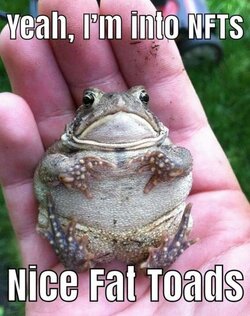It's been a while since I've looked into it, so my info is a bit rusty. Here goes!
NFT is a non-fungible token. This roughly translates to "unchangable token or irreplaceable token". The idea is simple; if any part of the token is changed, it becomes invalid. Like a password, of sorts! If you miss even one letter in a password, you won't be able to log in. Similarly, if you miss even a single bit of data in an NFT, the whole of it becomes invalid.
The reason how one can know that it's been changed without a centralized service is via something called 'blockchain technology'. The ideas, afaik, is that each block in the chain contains a 'hash' of the previous block. Wait wait, what's a hash? Well, ever heard the expression "A picture is worth a thousand words"? Well, a hash could be that translation of a picture into text; a picture now being worth a thousand bits! Or, well, hashes can be quite short. That's the charm! By just looking at a weird jumble of letters and then perform the 'hash operation' (math stuff) to recreate the hash, if the new hash is different from the one you used to have, the picture has in some way changed!
Now, we don't only hash pictures. We hash 'blocks'! What's a block? Well, it's basically just a box of things. You can put anything into this box, really. Well, besides water and bread and such. I've heard it ruins the hardware.

So, to bring it back around; we use the mathematical hash operation to create 'a hash' of a box of things. This hash ends up functioning as a receipt; because if anything changes in that box of things, and we then hash the box of things again, the new hash will look entirely different. Even with small changes!
So, in translation, a 'block' is a box of things. A 'hash' is a receipt. Each box contains the receipt of the previous box; and that's the trick! Because when we hash the new box, we also hash the old receipt. This way, we can see if the receipt has changed too! We create a chain of receipts, basically.
TL;DR or In conclusion:
I don't understand the concept too well to explain it as anything other than this: An NFT is a receipt of ownership of something!
Now, with the technical bits out of the way, it's time to go into the political side of things!
So, there's been a bit of controversy as far as I understand about NFTs. Namely, a lot of NFTs is a receipt of
a link rather than a picture itself. NFTs also currently isn't implemented in law at all (AFAIK), so it has no real value as of yet (It's a receipt no one but NFT advocates acknowledge). NFT advocates want it to become a legitimate type of receipt, used to copyright content on the Internet. So, let's say you draw something. Perhaps you could make an NFT just to mark ownership, and then use that receipt to copyright strike others. Without law, that's currently impossible, but that is, I think, what the NFT advocates want.
Another big problem with NFTs is that... Well, receipts already exists. The idea is, that NFTs are going to be used as receipts for digital goods, but if we wanted such a system, there's no reason a centralized receipt system (a regular receipt) wouldn't be able to do the same. The big strength of stuff like NFTs, is that it's entirely decentralized; meaning there's no authority needed to trade it. But that is about it, really.
Another problem with NFTs is that they can get stolen similarly to bitcoin, AFAIK. Which I think is done by basically copying the receipt, making a new transaction and creating a new receipt and bam, NFT gone... AFAIK. A bit uncertain on this part.
Personally, I'm not sure how I feel about having more styles of copyright than there already is. I'm... Mixed. I fear that it could end up being just another tool to unify wealth (yeah, I'm a leftist, okay?

) and that really concerns me. As nice as it sounds to have an easy receipt of your ownership, it's, eh, I'm not sure I like it.
... I hope I got the details right, hah.

 )
)


 Your support makes Blue Moon possible (Patreon)
Your support makes Blue Moon possible (Patreon)